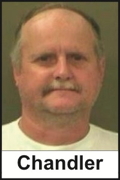Rascals case in brief
In the beginning, in 1989, more than 90 children at the Little Rascals Day Care Center in Edenton, North Carolina, accused a total of 20 adults with 429 instances of sexual abuse over a three-year period. It may have all begun with one parent’s complaint about punishment given her child.
Among the alleged perpetrators: the sheriff and mayor. But prosecutors would charge only Robin Byrum, Darlene Harris, Elizabeth “Betsy” Kelly, Robert “Bob” Kelly, Willard Scott Privott, Shelley Stone and Dawn Wilson – the Edenton 7.
Along with sodomy and beatings, allegations included a baby killed with a handgun, a child being hung upside down from a tree and being set on fire and countless other fantastic incidents involving spaceships, hot air balloons, pirate ships and trained sharks.
By the time prosecutors dropped the last charges in 1997, Little Rascals had become North Carolina’s longest and most costly criminal trial. Prosecutors kept defendants jailed in hopes at least one would turn against their supposed co-conspirators. Remarkably, none did. Another shameful record: Five defendants had to wait longer to face their accusers in court than anyone else in North Carolina history.
Between 1991 and 1997, Ofra Bikel produced three extraordinary episodes on the Little Rascals case for the PBS series “Frontline.” Although “Innocence Lost” did not deter prosecutors, it exposed their tactics and fostered nationwide skepticism and dismay.
With each passing year, the absurdity of the Little Rascals charges has become more obvious. But no admission of error has ever come from prosecutors, police, interviewers or parents. This site is devoted to the issues raised by this case.
On Facebook
Click for earlier Facebook posts archived on this site
Click to go to
Today’s random selection from the Little Rascals Day Care archives….
Click for earlier Facebook posts archived on this site
Click to go to
Today’s random selection from the Little Rascals Day Care archives….
A last chance at freedom – or the end of the road
 Feb. 15, 2012
Feb. 15, 2012
I asked Mark Montgomery for an update on Junior Chandler’s latest appeal of his two life sentences for child sexual abuse:
“There are two prongs to the appeal. First, I am asking the N.C. Supreme Court to simply do the right thing by Junior. The Court said in 2010 that expert testimony like that in Junior’s case is (and was) inadmissible. That being the case, it is fundamentally unfair for Junior to be facing the rest of his life in prison, when many defendants have been freed because this sort of testimony was used against them at trial.
“Second, Junior’s lawyer objected to the testimony but did not raise the issue on appeal. I argued in a motion in Superior Court that the lawyer was ineffective for abandoning the issue. The Superior Court judge denied the motion without a hearing. If the Supreme Court will not itself set aside Junior’s convictions, it should at least require a hearing on trial counsel’s conduct.”
This is how the process works: “Petitions such as Junior’s go to one of the six associate justices. He or she decides what should be done and then presents the case to the court as a whole in a monthly (sort of) closed door meeting. The justices then vote on whether to grant the petition. If the Court grants the petition, it usually requires full briefs from both parties, but may decide the case of the basis of the petition and the State’s response alone.
“If it denies the petition, that’s the end of the road.”
The court could respond as early as April 13, according to this chart of petitions allowed and denied.
Professor yet to decide about McMartin case
 June 28, 2013
June 28, 2013
“Children can lie, but research shows that they do not fabricate detailed descriptions of adult sexual acts unless they have experienced or witnessed them. Studies also show that children have good memories and that even preschoolers can remember key events like sexual abuse. One problem is that repeatedly molested children have great difficulty distinguishing one act of abuse from another and linking abuse to specific dates….
“In the McMartin case, we learned… to minimize the use of leading questions during interviews…. While the verdict comes as a disappointment to the children in the case, their courage and willingness to testify for weeks on end has been a catalyst for change that will protect countless other children.”
– From Believe the Children adviser Civia Tamarkin’s interview with John E. B. Myers, professor at McGeorge School of Law, University of the Pacific, in “The McMartin Nightmare” (People magazine, Feb. 5, 1990)
As his faculty bio notes, Professor Myers has long been “one of the country’s foremost authorities on child abuse,” especially in tracing its historical context, but he seems to have been excruciatingly slow to recognize the fraudulence of “satanic ritual abuse” claims. Although he stopped short of declaring the McMartins guilty, Myers clearly stationed himself in the “child saver” camp, more sympathetic toward serial interviewer Kee MacFarlane than toward the defendants whose lives she devastated.
In a journal article five years later, Myers would acknowledge “growing skepticism regarding children’s credibility,” at the same time warning of a “real danger that the pendulum will swing too far in the direction of disbelief.”
More recently, Myers addressed McMartin in “Child Protection in America: Past, Present, and Future” (2006), crediting it with raising the standard for interviewing, but concluding that “In the final analysis, we will never know what happened at the McMartin Preschool. From the outset, the case divided people into ‘true believers’ and skeptics….”
In “The Backlash: Child Protection Under Fire” (1994) Myers had added a most curious footnote: “I have no opinion regarding the guilt or innocence of any of the McMartin defendants.” How could he – a law professor! – acknowledge the corruption of the child-witnesses’ testimony, yet doubt the defendants deserved a “not guilty” verdict?
Almost 20 years later, I wondered whether Myers might have formed an opinion.
His emailed response: “No idea about guilt or innocence.”
High school students introduced to ‘Innocence Lost’

pastdaily.com
Edward R. Murrow
June 10, 2016
It’s heartening to see that, 25 years later, “Innocence Lost” is still shining light on the wrongful prosecution of the Edenton Seven – and for a younger audience! This is a note from Judy Griffin, a teacher at Hamilton High School in Michigan, who recently rediscovered Ofra Bikel’s eight-hour masterpiece:
“I want you to know how helpful it is (to have “Innocence Lost” available online). I teach in a resource room English class. The kids have no cognitive issues, but reading is a tremendous struggle. When they can receive the information through really good videos like this one, we can cover some great information.
“We start by reading Edward R. Murrow’s introduction to ‘This I Believe.’ Then the students create digital versions of their own. After that, they view ‘Good Night, and Good Luck.’ They have just learned about McCarthyism at this point in U.S. History, so it is fresh in their minds.
“We move then into The Crucible. The students are then asked to compare this to ‘Good Night, and Good Luck.’ They read ‘Why I wrote The Crucible’ by Arthur Miller.
“At the conclusion, we talk about how these hysterias are repeated and actually happened even prior to Salem. I introduce the Day Care scandal, and was thrilled to find the original ‘Frontline’ episodes. I had seen it when it aired!
“They are now researching various aspects of the hysteria. Some are looking at ‘satanic ritual abuse,’ some are looking at how hysteria spreads, some are researching what happened to the various defendants, and some are looking at the causes. We emphasize that this is not unique to any of these situations, and the point of this all is to show how vulnerable societies are to hysteria….”
![]()
‘Right much training but nothing like she needed’
May 8, 2013
“We just had all kinds of rumors. Everybody in town was involved in it, with this one pointing fingers, that one pointing fingers. My telephone was ringing right steady….
“We really didn’t know what we had. I had a police officer who works as a secretary (Brenda Toppin) who deals with this type case, and she had right much training but nothing like she needed. So we had problems right from the start.”
– Edenton Police Chief Charles Harvey Williams, recalling for a North Carolina House committee how his 15-person department struggled to sort out allegations about the Little Rascals Day Care center (April 23, 1991)
Toppin has been variously described as a secretary and a dispatcher in Edenton’s 15-person police department – she may well have been both. Regardless, she seemed utterly unaware how far in over her head she was interviewing children about supposed ritual sex abuse.











0 CommentsComment on Facebook